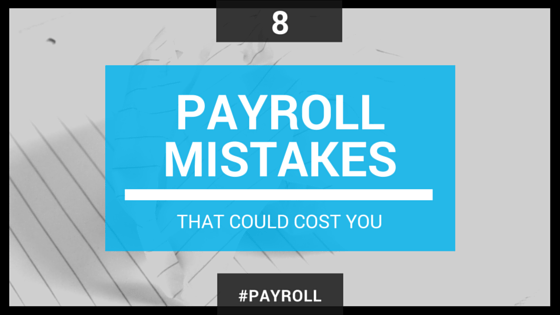Whether you own a small business with one employee or a growing company with dozens, mistakes are bound to happen. Unfortunately when it comes to payroll, those mistakes can end up costing you a pretty penny.
Did you know that in 2014 U.S. businesses were fined roughly $5 billion in payroll tax penalties? That’s a good chunk of funds to give up for unintentional mishaps. But don’t add a payroll penalty line item to your budget yet! We have compiled a list of eight common payroll mistakes that businesses make so you can avoid them…and the penalties that follow.
ONE. Demographic errors
Incorrectly entering demographic data such as employee name, address, Social Security number, deductions, or direct deposit information, can cause inaccuracies in unemployment tax payment, Social Security records, W-2s, etc. These errors can be caught simply by reviewing your data prior to submission. It’s a good practice to have your employees review their paystubs for accuracy as well.
TWO. Incorrect classification of workers
Another mistake businesses make is classifying workers incorrectly. By misclassifying employees as independent contractors you fail to withhold income taxes, withhold and pay Medicare and Social Security and pay unemployment taxes. Not only are you liable for the employer portion of these taxes, you could end up liable for a percentage of the employee’s portion as well and incur penalties and interest.
According to the IRS, workers are employees if you control what work they perform and when and how that work is performed. Reference the IRS
worker classification resources for more information.
THREE. Improper handling of garnishments, levies, or child support
If you fail to send court-ordered payments on behalf of an employee, you may be liable for the amount owed by the employee. You may also face civil penalties. Make sure these are entered into the
payroll system as soon as the notice is received and that payments are made as ordered. Also be aware that there are limits to the amount of an employee’s pay that can be taken for garnishments and certain rules apply to the order garnishments and other deductions should be applied to an employee’s check.
FOUR. Failure to record manual checks
There is no denying that direct deposit is the preferred method of payment. Nevertheless, if you do give an employee a manual paper check, it must be recorded. Failure to do so can mean your accounts become unbalanced, your tax deposits will be inaccurate, and your company may be subject to IRS penalties. If you do have a need to write manual checks, create a process of recording and reporting them to avoid any mishaps.
FIVE. Late or incorrect tax deposits
Taxes can be confusing and time consuming. However, you definitely want to stay clear of any errors. If you miss tax deposit deadlines established by the IRS, or make an incorrect tax payment, you could be audited and liable for not only the missed taxes but also penalties. Create a reliable calendar system and give yourself plenty of time to prepare, file and deposit taxes to meet all deadlines. And if you outsource your payroll tax filling, keep in mind you are still ultimately responsible for the accuracy and timeliness of your tax filings and payments. Be sure to request and inspect tax payment notifications to ensure your provider is on schedule.
SIX. Outdated SUI rate
SUI, or state unemployment insurance, is an employer tax rate logged in your payroll system. The rate changes over time and if the new rate is not updated, you could have inaccurate payments and face penalties from the state agency. Most states change rates at the beginning of the year, so when you receive a notice from the SUI agency, update the rate and the correct effective date within your payroll system. If you outsource your payroll, promptly send the SUI notice to your provider so that they can make the proper system adjustments.
SEVEN. Treating payroll as a backburner function
Processing payroll is a serious matter. Accidentally entering the wrong data or missing deadlines can mean cash flow issues for your employees and IRS penalties for you. To prevent this, ensure the person on your team responsible for payroll is an expert. Ensure he or she is given adequate training and absolutely put an auditing system in place so no one person is responsible for running, approving and auditing payroll. Schedule and protect time on a weekly or biweekly basis to run the payroll function. Do not wait until the last minute – a rushed payroll is asking for trouble.
EIGHT. Failure to apply changes in laws & regulations
The last mistake that you want to steer clear of is the failure to apply changing and brand new laws and regulations that affect payroll. You could over-withhold federal income tax, underpay state unemployment taxes, fail to collect and pay local taxes and incorrectly calculate fringe benefits when reporting income, just to name a few consequences. Be sure to avoid this by staying up to date with laws and regulations by monitoring federal, state and local tax agency newsletters, joining the American Payroll Association, subscribing to professional journals, attending free webinars or continuing education classes and taking advantage of free resources offered by payroll outsourcing providers and your CPA.
There you have it, eight payroll mistakes and what you can do to avoid them. Payroll is a complex and ever-changing function where mistakes are far reaching, easy to make and difficult to resolve. By being aware of common mistakes, you can expertly pay your employees and your taxes while also avoiding costly penalties. Now that’s a win-win-win – for you, your employees and your bottom line.
For tax and legal guidance, please seek the counsel of a certified tax professional and an attorney. Inova Payroll does not provide professional tax and legal services.




